Kernel Modules
Basics:
- A programming module with interfaces
- Communication Medium between application/user and hardware → lives in Kernel Space + used for hardware access with minimal functionality
- can be hot loaded/unloaded - only possible with
rootprivileges → actual name "Loadable Kernel Module" - Gateway to User Space through File Interface with a virtual File (
/sys/..)
Types:
- Device Drivers
- Filesystem Drivers
- Network Drivers
LKM Utilities Commands:
# Insert an LKM into the kernel
sudo insmod <module.ko>
# Remove an LKM from the kernel
sudo rmmod <module>
# List currently loaded LKMs
sudo lsmod
# Display information of LKM object file
sudo modinfo <module.ko>
# Insert or remove an LKM, when in /lib/modules
sudo modprobe
Discoverable Hardware
- PCI/USB devices are discoverable.
- When connecting a device to a bus, it receives a unique identification used for communication with the CPU.
- PCI/USB devices tell the system what sort of device they are
Non-discoverable Hardware
- Simple Interfaces (I2c or SPI) are not discoverable
- Such hardware has to be explicitly defined → in Device Tree
- Kernel Modules communicating with the Device Tree are called → Platform Drivers
Concept
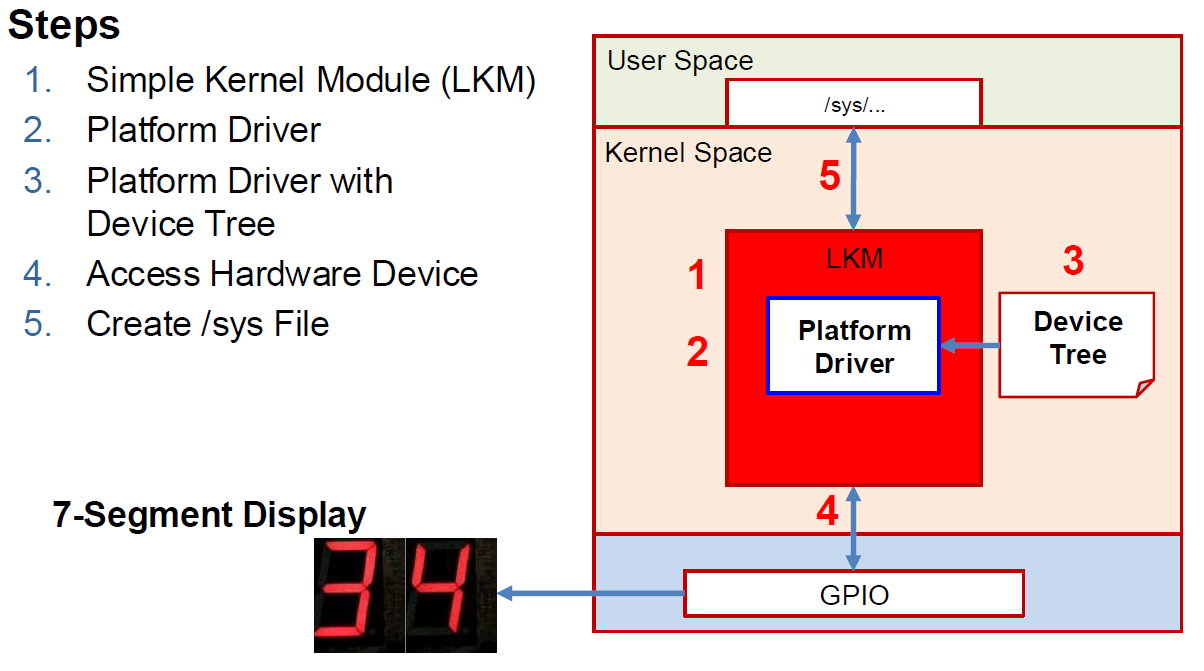
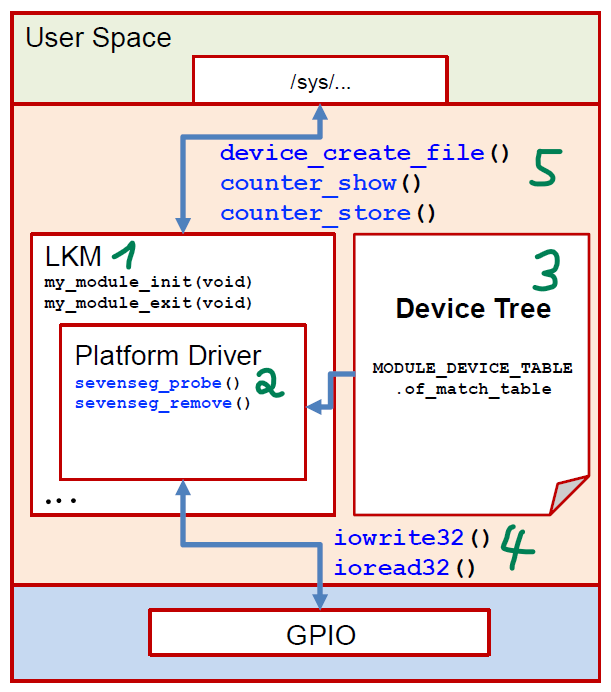
1. Simple LKM
Minimal viable LKM:
#include <linux/kernel.h>
#include <linux/module.h>
// init function
static int __init my_module_init(void) {
...
}
// exit function
static void __exit my_module_exit(void) {
...
}
/*
* The next calls are mandatory -- they identify the initialization
* and the cleanup function (as above).
*/
module_init(my_module_init);
module_exit(my_module_exit);
/* Kernel module description */
MODULE_LICENSE("GPL");
MODULE_AUTHOR("Vladimir Lenin");
MODULE_DESCRIPTION("A desc.");
MODULE_VERSION("1.0");
C does not have namespace-functionality → naming conflicts/pollition possible
Avoid Kernel namespace pollution: always use static for global vars. to give it file internal linkage
2. Platform Driver
- Defines a data structure that keeps track of device state.
- Implements a set of helper functions, interrupt handlers, etc.
- Defines a
probe()method - Similarly defines a corresponding
remove()method - Registersthe device to the Kernel in the
__initmethod - Similarly unregisters the device in the
__exitmethod
Probe:
Input: a structure describing the device:
int driver_probe(struct platform_driver *pdev)
- Initializes device
- Maps I/O memory
- Registers Interrupt Handlers
- Starts Kernel Threads
- Registers device to proper kernel framework
Remove
Input: a structure describing the device:
int driver_remove(struct platform_driver *pdev)
- No general responsibilities → open to implementation
Registration
Put everything together with LKM:
- define
probeandremovefunctions - declare them in Platform Driver Definition
- Un-/Register Platform Driver Definition using
__exitand__initmethods
#include <linux/platform_device.h>
#include <linux/mod_devicetable.h>
// Example struct device desc.
struct platform_driver {
int (*probe) (structplatform_device *);
int (*remove) (structplatform_device *);
void (*shutdown) (structplatform_device *);
int( *suspend) (structplatform_device *, pm_message_tstate);
int (*resume) (structplatform_device *);
struct device_driverdriver;
const struct platform_device_id *id_table;
};
// Initialization Platform Driver Definition
static struct platform_driver sevenseg_driver = {
.driver = {.name = "sevenseg",
.owner = THIS_MODULE,
.of_match_table = sevenseg_device_tree_ids, // see point "3. Platform Driver with Device Tree"
},
.probe = sevenseg_probe, // Declare probe function
.remove = sevenseg_remove // Declare remove function
};
static int sevenseg_probe(struct platform_device *pdev) {
...
}
static int sevenseg_remove(struct platform_device *pdev) {
...
}
// registration
static int __init sevenseg_init(void) {
platform_driver_register(&sevenseg_driver);
return 0;
}
static void __exit sevenseg_exit(void) {
platform_driver_unregister(&sevenseg_driver);
}
3. Platform Driver with Device Tree
Platform Driver has to be linked somehow to the correct device node in the Device Tree
In Device Tree:
sevenseg {
compatible = "sevenseg"; //<---- searched string
}
In Platform Driver:
...
static const struct of_device_id sevenseg_device_tree_ids[] = {
{
.compatible = "sevenseg",
},
{}};
MODULE_DEVICE_TABLE(of, sevenseg_device_tree_ids);
static struct platform_driver sevenseg_driver = {
.driver = {.name = "sevenseg",
.owner = THIS_MODULE,
.of_match_table = sevenseg_device_tree_ids, // <----- look here
},
.probe = sevenseg_probe, // Declare probe function
.remove = sevenseg_remove // Declare remove function
};
....
4. Access Hardware Device
- Use global data structure for information exchange between methods
- Use
probfunction to allocate memory and registerstruct
...
/*
* Type definitions and global variables for kernel module
*/
typedef struct sevenseg_platform_data {
struct device* dev;
int counter;
int mode;
void __iomem* base_addr;
int irq;
struct task_struct* kthread_sevenseg;
} sevenseg_platform_data;
...
static int sevenseg_probe(struct platform_device *pdev) {
struct sevenseg_platform_data* pdata;
...
pdata = devm_kzalloc(&pdev->dev, sizeof(pdata), GFP_KERNEL); // allocate memory
platform_set_drvdata(pdev, pdata); // register bzw. set struct as "driver data"
...
}
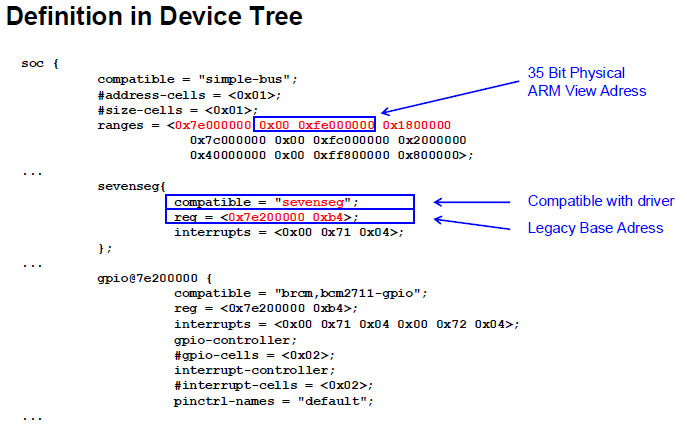
How to get resource and virtual address from Device Tree, implement in prob function:
static int sevenseg_probe(struct platform_device* pdev) {
struct sevenseg_platform_data* pdata;
struct resource* res;
...
res = platform_get_resource(pdev, IORESOURCE_MEM, 0); // <-------- get resource from Device Tree
if(res == NULL) {
pr_err("platform_get_resource() failed! \n");
return -1;
}
pr_info("Info: 35Bit ARM Address: 0x%x \n", res->start);
pdata->base_addr = devm_ioremap_resource(&pdev->dev, res); // <-------- get virtual address
if(IS_ERR(pdata->base_addr)) {
pr_err("Error: devm_ioremap_resource() failed! \n");
return PTR_ERR(pdata->base_addr);
}
pr_info("Info: Virtual Address: 0x%x \n", pdata->base_addr);
...
return 0;
}
Write to Peripheral: void iowrite{$X$}(u{$X$} value, void* addr);
Read from Peripheral: void ioread{$X$}(void* addr);
With {$X$} = 8 or 16 or 32
Example usage in device setup:
static int sevenseg_probe(struct platform_device* pdev) {
struct sevenseg_platform_data* pdata;
struct resource* res;
...
// Configure different GPIOs
// Setup keys as GPIO_IN
init_gpio(pdata, keys[1], GPIO_IN); // <----- uses iowrite32 & ioread32
set_trigger_gpio(pdata, keys[1], GPIO_EDGE_FALLING); // <----- uses iowrite32 & ioread32
init_gpio(pdata, keys[0], GPIO_IN); // <----- uses iowrite32 & ioread32
set_trigger_gpio(pdata, keys[0], GPIO_EDGE_FALLING); // <----- uses iowrite32 & ioread32
// Setup the two sevenseg's to GPIO_OUT
for(i = 0; i < 8; i++) {
init_gpio(pdata, sevensegs[0][i], GPIO_OUT); // <----- uses iowrite32 & ioread32
init_gpio(pdata, sevensegs[1][i], GPIO_OUT); // <----- uses iowrite32 & ioread32
}
// Initialize the sevenseg with the first number
sevenseg_write(pdata, pdata->counter); // <----- uses iowrite32
dev_info(&pdev->dev, "Info: Finished initializing sevenseg \n");
...
return 0;
}
5. Create /sys File
Platform Dreiver needs to:
- provide
storeandshowfunctions - "register" their function pointers
- create virtual file in /sys that will be writen to/read from → in
probeandremovefunctions
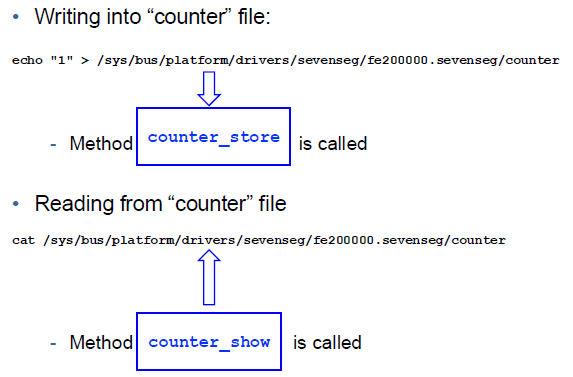
- and 2.
// user writes to file "counter"
static ssize_t counter_store(struct device* dev,
struct device_attribute* attr,
const char* buf,
size_t count) {
...
}
// user reads from file "counter"
static ssize_t counter_show(struct device* dev,
struct device_attribute* attr,
char* buf) {
...
}
// Macro to define counter and show/store Function
DEVICE_ATTR(counter, 0644, counter_show, counter_store);
Location of „File“: /sys/bus/platform/drivers/sevenseg/fe200000.sevenseg/counter
static int sevenseg_probe(struct platform_device* pdev) {
struct sevenseg_platform_data* pdata;
struct resource* res;
...
// Create File "counter"
ret = device_create_file(&pdev->dev, &dev_attr_counter); //<----- create
if(ret != 0) {
pr_err("device_create_file() failed with: %d() \n", ret);
return -1;
}
...
return 0;
}
static int sevenseg_remove(struct platform_device* pdev) {
struct sevenseg_platform_data* pdata = platform_get_drvdata(pdev);
device_remove_file(&pdev->dev, &dev_attr_counter); //<----- remove
kthread_stop(pdata->kthread_sevenseg);
return 0;
}
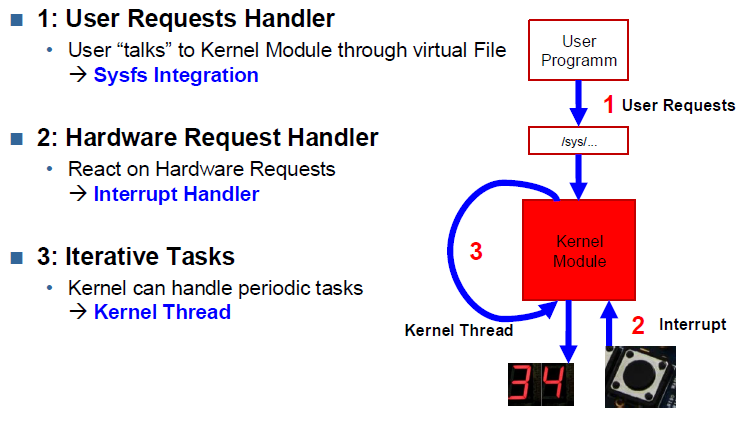
Interrupts
Device Tree Interrupt Definition:
Interupt Controler: Interupt Handling Device
<------Device Tree------>
HW that "initiates" interrupt Hardware that "reacts" to interupt → i.e. where ISR is implemented
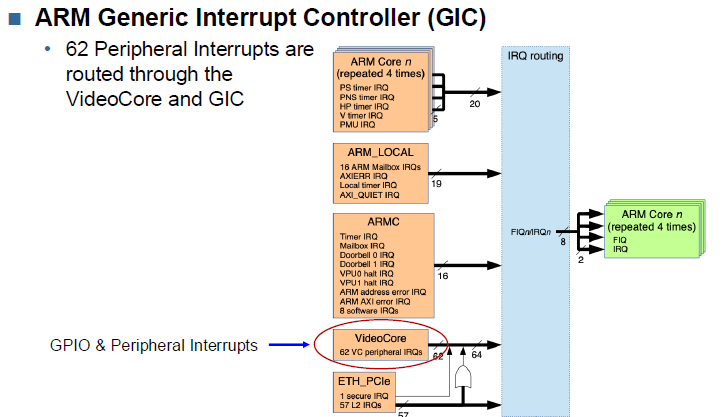
Definition in Device Tree:
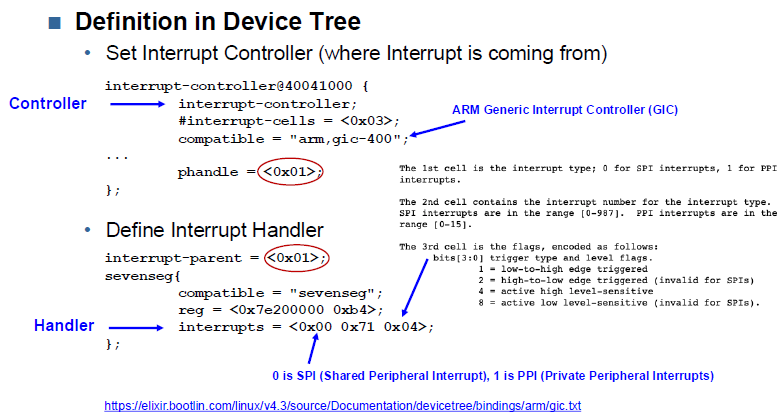
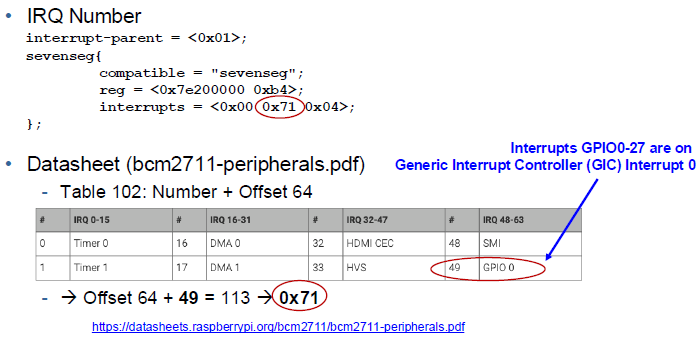
Code Example
static irqreturn_t irq_handler(int this_irq, void* data) {
... // interrupt logic here
// clear Interrupt
iowrite32(0x1 << keys[1], pdata->base_addr + GPEDSX_OFFSET(keys[1]));
iowrite32(0x1 << keys[0], pdata->base_addr + GPEDSX_OFFSET(keys[0]));
// ^ GPIO Pin Event Detect Status Register
return IRQ_HANDLED;
}
static int sevenseg_probe(struct platform_device* pdev) {
...
pdata->irq = irq_of_parse_and_map(pdata->dev->of_node, 0); // <------ Parse Device Tree for Interrupt
if(pdata->irq != 0) {
if(devm_request_irq(pdata->dev, pdata->irq, irq_handler,
IRQF_TRIGGER_NONE, "sevenseg", pdata)) { // <------ Register Interrupt Handler
pr_err("Error: Could not request IRQ\n");
return -ENODEV;
}
}
...
return 0;
}
Interrupt Handler using GIC
static void set_trigger_gpio(struct sevenseg_platform_data *pdata,
int gpio, int mode) {
switch(mode) {
case GPIO_EDGE_FALLING:
offset = GPFENX_OFFSET(gpio);
break;
}
...
rdval = ioread32(pdata->base_addr + offset);
rdval |= (0x1 << gpio);
iowrite32(rdval, pdata->base_addr + offset);
}
static int sevenseg_probe(struct platform_device *pdev) {
....
// Initialize GPIO and set trigger
init_gpio(pdata, keys[1], GPIO_IN);
set_trigger_gpio(pdata, keys[1], GPIO_EDGE_FALLING);
return 0;
}
Threads
kthread_run(threadfn, data, namefmt);
Create a new thread and run it
- Threadfn: Function name to run
- Data: Pointer to function arguments, given when started
- Namefmt: The name of the thread (visible in ps)
- Returns a task_struct
kthread_should_stop(); // Check, if thread needs to stop
kthread_stop(struct task_struct *thread); // stops thread
Example from out sevenseg implementation:
static int thread_fn(void* data) {
struct sevenseg_platform_data* pdata = (struct sevenseg_platform_data*)data;
int i = 0;
pr_info("Info: Thread entered\n");
while(!kthread_should_stop()) {
if(pdata->mode == COUNTING) {
pdata->counter = pdata->counter == 0 ? 99 : --pdata->counter;
}
sevenseg_write(pdata, pdata->counter);
msleep(500);
}
return 0;
}
static int sevenseg_probe(struct platform_device *pdev) {
....
pdata->kthread_sevenseg = kthread_run(thread_fn, pdata, "kthread_7seg");
return 0;
}
static int sevenseg_remove(struct platform_device* pdev) {
....
kthread_stop(pdata->kthread_sevenseg);
return 0;
}